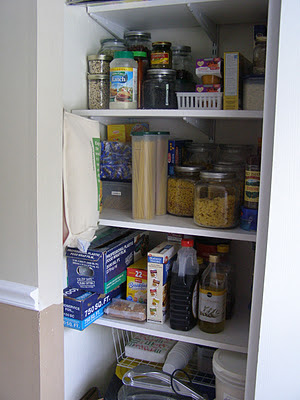This week I’m linking to 4 Moms: 35 Kids ~ How Moms of Many Manage and posting on the topic of food storage for large families. See links at the bottom to their sites for more ideas on making the most of your food storage area, maybe get some storage ideas and money saving tips.
Why have a food "pantry"?
Living in a hurricane possible location, having food on hand and a plan for keeping our perishables from spoiling in a power outage is just sensible. Building a food pantry has cost benefits for our family, too. As most large families, feeding the crew can be expensive if you don’t plan and budget appropriately for it. For this reason and others, I try to buy based on the best unit price and for certain foods will buy based on the healthiest choice. With the savings over time having a food pantry provides, healthier purchases can be made on certain foods while staying within our overall weekly budget. Basically speaking then we have three reasons for having a food pantry: cost benefit, preparedness benefit and nutrition benefit. Every family who has a food pantry will reflect the needs and priorities of that family with amounts of what to have on hand, the types of foods selected to store and the space allotted for doing so factors to consider.
How do we build our food "pantry"?
As a large family, saving money and stretching the ever-decreasing valued dollar is a weekly endeavor. Over time and as our food budget permits, I make purchases when items are on sale, using coupons when available, but mainly focusing on the bottom line…the best unit price. I will buy extras of those sale items {only purchasing the items we like and use} and store them in our food pantry. This method helps to build having extras on hand of the items we consistently use. When meal planning, I have attempted to keep our meals simple, drawing from recipes that use normal, everyday ingredients. Having a meal plan helps to save money and save food waste.
Where do we make purchases from to build our food "pantry"?
1. Buying in bulk {i.e.
Sam’s Club,
Costco Wholesale Club, etc.}
2. Purchasing through a food co-op {i.e.
BreadBeckers,
Montana Wheat Company, etc.}
3. taking advantage of buy one get one free offers
4. using store and manufacturer’s coupons or competitor ads being match by select retailers {
Wal*Mart will match any valid competitors ad for the exact item,
Publix will accept select competitors’ coupons and some stores double coupons…ask your local grocery or discount chain in your area to see what they will do}
5. purchasing meat from local farm for no hormones, no antibiotics, grain/grass fed purposes {i.e. beef and pork}
Other options could include: purchasing from local farmers or farmer’s markets for fresh/organic produce or even an organic produce co-op, growing your own fruits and vegetables or bartering with those who do, and discount food chains or outlets.
Where do we store these savings and how?
I have posted on storage ideas in the past here, but this week I will cover more specifically our food storage areas.
1. Meats ~ if bought in bulk from the grocery or wholesale club, then we will repackage it into freezer bags based on our families’ consumption and date the package, remove air and lay flat in our upright freezer {maximizing the space}
2. Can goods and boxed items ~ I keep opened and a base amount in our inside kitchen pantry…I’ll call this my working pantry and my surplus is kept in our garage storage area.
a. First, my kitchen pantry storage:
i. Items such as pasta, dry beans, baking supplies, snacks, dry cereals, etc. of which we would use on a frequent basis are kept inside and stored in glass jars like
these or
these {both made in the
USA}, Tupperware storage containers like
these, plastic storage bins, or food buckets.
ii. When my base count gets low, I will refill that item into its storage container {i.e. Pastas are removed from their manufacturer packaging and put in the labeled storage container designated. Dry beans are emptied from their packaging and kept in glass jars. Snack items such as popcorn, animal crackers, snack bars, crackers, etc. are removed from their manufacturer boxes and stored in their designated containers. This allows my kitchen pantry to stay organized, gives me a visual on when my stock is getting low {since the containers are clear} and keeps food from spoiling, as their containers are air tight.
b. Next, my garage storage area {you can read a little about it
here}:
i. I now have floor to ceiling adjustable wall shelving {thanks to my dear husband} for storing my extra can items, boxed items and room for my 5 gallon buckets underneath {these are the ones with air-tight gamma lids on them}
ii. I have used the old storage shelf for putting wheat buckets, canning supplies and seasonal kitchen supplies on.
iii. I have a couple wire rack shelves for storing bulk paper products, storage containers and baskets {for our ongoing organizing & re-organizing projects in our home}, hospitality items {i.e. drink containers, trays and divided platters, chargers, etc.} and bulk drinks {water bottles, flavored juices, etc.}

3. Perishables ~ Items I will stock up on such as milk, eggs, cheese, in-season fruits and veggies are kept in our kitchen refrigerator with extras kept in our garage refrigerator. This method allows me to take advantage of sales, thus saving money in the long run.
For our large family, doing items 1-6 above are beneficial for our pocket books as well as our health. Side benefits from having a food pantry include having food during slow economic times {aren’t we there now?}, for preparedness in response to natural disasters {hurricanes, flooding, power outages, etc.} when trips to the store may not be possible and even ministering to others who may be in need.
I draw from the Scriptures in providing for our family without becoming out-of-balance or extreme. Our faith and trust is in the Lord to provide therefore, our trust and hope is NOT in our food pantry or earthly possessions. Here are a few to verses to encourage you as well:
- A slack hand causes poverty, but the hand of the diligent makes rich. He who gathers in summer is a prudent son, but he who sleeps in harvest is a son who brings shame. Proverbs 10:4-5 {not to be one who would seek riches of this earth, but on the contrary, one who is willing to work so their future is secure}
- She is like the ships of the merchant; she brings her food from afar. She rises while it is yet night and provides food for her household and portions for her maidens. She considers a field and buys it with the fruit of her hands she plants a vineyard. She opens her hand to the poor and reaches out her hands to the needy. She is not afraid of snow for her household, for all her household are clothed in scarlet. Strength and dignity are her clothing, and she laughs at the time to come. She looks well to the ways of her household and does not eat the bread of idleness. Proverbs 31:14-16, 18, 20-21, 25, 27 {to be a woman who is resourceful, is profitable in her undertakings, is giving, is aware of the needs of her own family and insures those needs are met, is a preparer and secure in the days ahead and works diligently for her family}
- Do not lay up for yourselves treasures on earth, where moth and rust destroy and where thieves break in and steal, but lay up for yourselves treasures in heaven, where neither moth nor rust destroys and where thieves do not break in and steal. For where your treasure is, there your heart will be also. Matthew 6:19-21 {the balance…not to be so consumed with a food storage pantry and its contents…or anything else for that matter, that it becomes the hope and source of faith and trust ~ not to replace the Lord who is over all}
Basically, my hope is to be the best “keeper of my home” as possible, drawing from the Lord’s word for how to do that, gleaning from others so that we can be good stewards of what He provides and trusting in Him to provide for all our needs as He sees fit to do.
May you seek His direction for ways to maximize what space He has given you and His wisdom to prepare as He leads you.
Blessings ~
Linked this week to:



























































